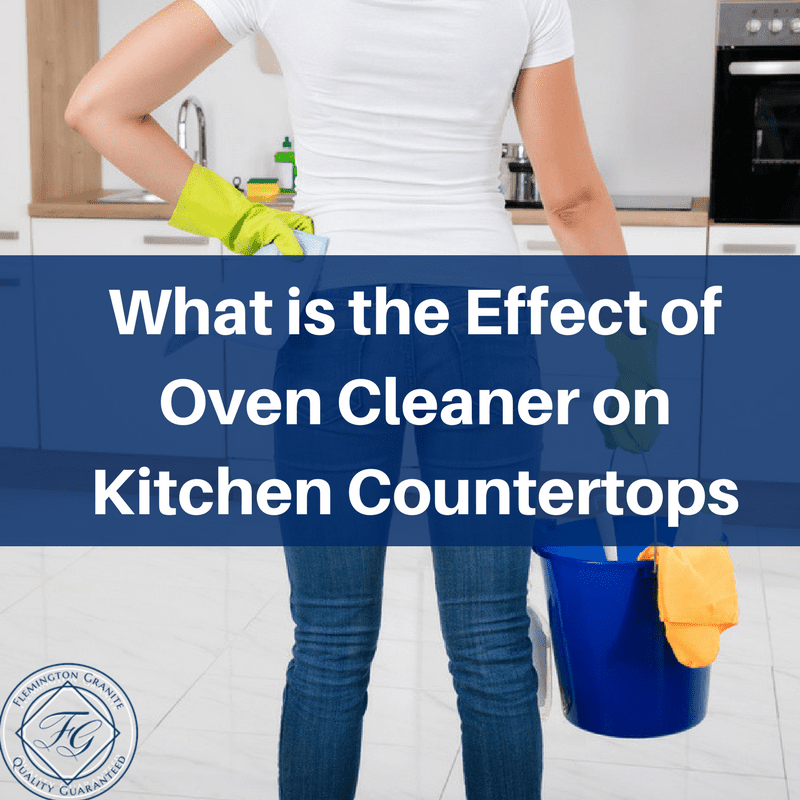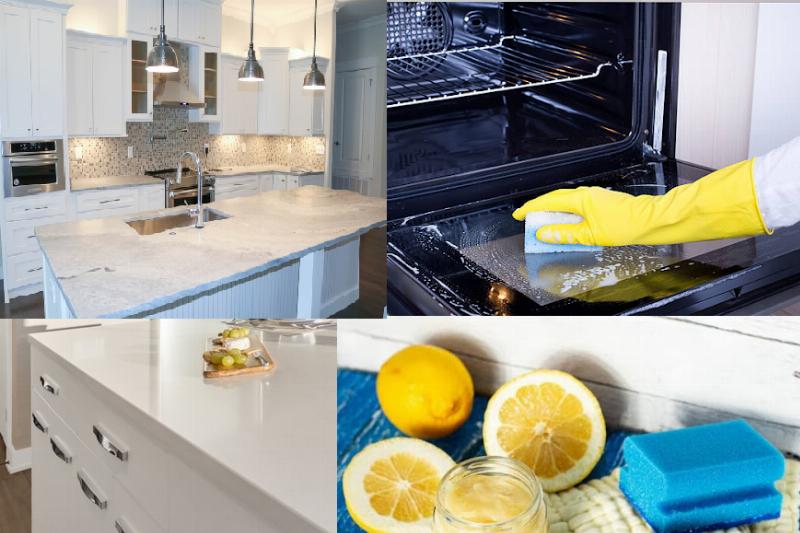Imagine this: You’ve just finished cooking a delicious meal, and now it’s time to clean up. You reach for the oven cleaner, a trusty ally in tackling stubborn grease and grime.
But wait—have you ever wondered what effect this powerful product might have on your kitchen countertops? If you’re like most people, your countertops are an investment. They’re the heart of your cooking space, and keeping them in pristine condition is essential.
Using oven cleaner on your countertops might seem like a convenient shortcut, but is it really safe? Understanding the impact of harsh chemicals on different countertop materials is crucial to maintaining their beauty and longevity. We’ll delve into the effects of oven cleaner on various types of kitchen countertops. By the end, you’ll know exactly how to protect your surfaces and keep your kitchen looking as good as new. Ready to uncover the truth? Let’s dive in!

Credit: flemingtongranite.com
Chemical Composition Of Oven Cleaners
Understanding the chemical composition of oven cleaners is crucial. These cleaning agents contain powerful ingredients designed to tackle stubborn grease and grime. While effective for ovens, their potency can pose risks to kitchen countertops.
Active Ingredients
Oven cleaners often contain sodium hydroxide, known as lye. This ingredient dissolves tough stains and grease. Yet, it can damage surfaces if used improperly. Another common component is potassium hydroxide, which boosts cleaning power.
Corrosive Properties
Many oven cleaners have corrosive elements. They can degrade materials like laminate, wood, or stone. The corrosive nature helps in removing baked-on food, but it can ruin countertop finishes.
Surfactants And Solvents
Surfactants in oven cleaners help break down oily residues. Solvents dissolve stubborn stains. While effective, they can leave countertops vulnerable to discoloration or damage.
Fragrances And Additives
Some cleaners have added fragrances for a fresh scent. These additives can react with countertop materials. This reaction may lead to unwanted residue or fading.
Understanding these chemical components helps in making informed choices. Ensure your countertop’s safety by knowing what each ingredient can do.

Credit: flemingtongranite.com
Common Materials Of Kitchen Countertops
Kitchen countertops are the backbone of every cooking space, providing both functionality and style. They come in a variety of materials, each with its own unique characteristics and maintenance needs. If you’ve ever wondered how different countertop materials react to cleaning products like oven cleaner, you’re not alone. Let’s explore some common countertop materials to help you make informed choices for your kitchen.
Granite
Granite countertops are favored for their durability and natural beauty. However, the harsh chemicals in oven cleaner can eat away at the sealant, leaving your granite vulnerable to stains and discoloration. You might think granite is invincible, but using an oven cleaner could leave you with costly repairs. It’s essential to use gentle cleaners specifically designed for stone surfaces.
Quartz
Quartz countertops are engineered to be non-porous and stain-resistant, making them a popular choice for kitchens. Despite their resilience, oven cleaner can still cause damage. The chemicals may dull the finish or cause discoloration. If you’re considering quartz, ensure you use mild cleaning agents to keep your countertop looking pristine.
Laminate
Laminate countertops are budget-friendly and come in various designs. They might seem easy to clean, but oven cleaner can cause the surface to bubble or peel. If you’ve ever seen a laminate countertop with unsightly blisters, it’s likely due to harsh cleaning chemicals. Stick to gentle cleaners to preserve the laminate’s appearance.
Marble
Marble countertops are synonymous with luxury, but they require careful maintenance. Oven cleaner can etch the surface, leaving permanent marks. If you have marble, you know it’s an investment worth protecting. Use pH-neutral cleaners to maintain its elegance without risking damage.
Butcher Block
Butcher block countertops add warmth and character to any kitchen. However, they are susceptible to damage from oven cleaner, which can strip away the finish and dry out the wood. You might have experienced this first-hand if your countertop looks dull and lifeless after cleaning. Regular oiling and mild soap are key to keeping butcher blocks in top condition.
Considering these materials, what steps will you take to ensure your countertops remain in excellent shape? Remember, knowing the specific needs of your countertop material can save you from unnecessary headaches and repairs. Choosing the right cleaner isn’t just about appearance; it’s about preserving the integrity of your kitchen’s centerpiece. So, what’s your countertop story?
Reactions With Natural Stone Surfaces
Oven cleaners can have unexpected effects on natural stone countertops. These products contain strong chemicals. They help remove tough stains and grease. Yet, they might harm beautiful stone surfaces. Granite and marble are popular choices in kitchens. Each reacts differently to oven cleaner exposure. Understanding these reactions is crucial. It helps maintain the beauty of your kitchen.
Granite Sensitivity
Granite is durable but not invincible. Acidic oven cleaners can damage its surface. The chemicals may cause discoloration. They can also weaken the sealant. This exposes the stone to further damage. Granite’s porous nature absorbs spills easily. Oven cleaner residue can stain the stone deeply. Always wipe spills quickly. Use gentle, pH-balanced cleaners for granite care.
Marble Vulnerability
Marble is more delicate than granite. It reacts strongly to acidic substances. Oven cleaner can etch its surface. This leaves dull spots behind. Etching affects marble’s natural shine. It can be costly to repair. Marble absorbs liquids faster than granite. This makes it more prone to stains. Protect marble with regular sealing. Choose mild cleaners for everyday use.
Impact On Synthetic Countertops
Oven cleaners can damage synthetic countertops. Their harsh chemicals may cause discoloration or surface deterioration. It’s essential to use gentler cleaning alternatives to maintain countertop integrity.
When you’re cleaning your kitchen, the last thing you want is to damage your countertops with harsh chemicals. But what really happens when oven cleaner comes into contact with synthetic countertops? It’s essential to understand these effects so you can keep your kitchen looking pristine. Let’s dive into how oven cleaners interact with quartz and laminate surfaces.Quartz Durability
Quartz countertops are known for their toughness. But does that mean they’re immune to the effects of oven cleaners? Not entirely. Although quartz is durable, the chemicals in oven cleaners can still cause damage. The acidity and abrasiveness can dull the finish over time. You might notice a loss of shine or slight discoloration if you frequently use these cleaners. It’s better to stick to mild, non-abrasive cleaning agents for your quartz surfaces. Have you ever noticed any subtle changes in your countertops after cleaning?Laminate Risks
Laminate countertops, on the other hand, are more vulnerable to damage from oven cleaners. The strong chemicals can cause the laminate to peel or warp. This can lead to unsightly bubbles or even permanent stains on your countertops. Using harsh cleaners can also weaken the adhesive holding the laminate to the substrate. This can result in costly repairs. Consider using a gentle, all-purpose cleaner instead. Have you ever wondered why your laminate countertops have started to lift at the edges? It’s time to rethink your cleaning routine. By understanding the impact of oven cleaners on synthetic countertops, you can make informed choices about which products to use. Protecting your investment now can save you time and money in the long run. How do you plan to care for your countertops moving forward?Short-term And Long-term Effects
Oven cleaner can be harsh on kitchen countertops. It’s important to know its effects. Short-term and long-term impacts vary greatly. Understanding these can help prevent damage and save costs.
Immediate Damage Signs
Oven cleaner can cause immediate harm. Countertops may lose their shine. Stains might appear quickly. The surface can become rough or discolored. These signs are easy to spot. They can affect the countertop’s appearance.
Long-term Structural Issues
Long-term exposure to oven cleaner is more damaging. The countertop’s material can weaken over time. Cracks might develop in the surface. The bonding agents may deteriorate. This leads to structural problems. Eventually, the countertop might need replacement.
Safety Measures And Precautions
Oven cleaner can damage kitchen countertops. It might cause discoloration, surface etching, or permanent stains. Always check compatibility before use to avoid harm.
Cleaning kitchen countertops with oven cleaner requires careful handling. While these cleaners are powerful against stubborn stains, they can also be harsh on surfaces, posing potential risks. Understanding safety measures and precautions is crucial to ensuring both your health and the longevity of your countertops. Let’s delve into essential safety practices you should adopt.Protective Gear And Ventilation
Wearing protective gear is non-negotiable. Oven cleaners often contain strong chemicals that can irritate your skin and eyes. Equip yourself with rubber gloves and safety goggles before beginning the cleaning process. This simple step can prevent discomfort and health issues. Ventilation is equally important. The fumes from oven cleaners can be overwhelming and potentially harmful. Keep windows open and use fans to circulate air while cleaning. Imagine breathing in those harsh chemicals without adequate airflow—it’s not worth the risk.Safe Application Techniques
Applying oven cleaner safely requires attention to detail. Always read the label instructions carefully. Use only the recommended amount to avoid damaging your countertops. It’s tempting to use more cleaner for stubborn stains, but overuse can strip surfaces and cause long-term damage. Consider spot testing a small area first. This ensures the cleaner is safe for your countertop material. It’s a small step that can prevent a major mishap. Do you remember the last time you rushed through cleaning without reading instructions? It might have led to an unexpected issue. Slow down and focus on safe application techniques to protect your kitchen surfaces effectively. By adopting these safety measures, you can clean your countertops efficiently while minimizing risks. Are you ready to tackle those stains without compromising your kitchen’s integrity?Alternative Cleaning Solutions
Oven cleaner can damage kitchen countertops. Chemicals in the cleaner may cause stains or discoloration. Always test cleaners on small areas first.
When it comes to maintaining the shine and integrity of your kitchen countertops, oven cleaner might not be your best friend. Harsh chemicals can damage surfaces like granite, marble, and even laminate. So, what should you use instead? Let’s explore some alternative cleaning solutions that are both effective and kind to your countertops.Homemade Cleaners
Imagine opening your pantry and finding everything you need for a spotless kitchen. Baking soda and vinegar are a powerful duo for cleaning. Mix them into a paste to tackle stains. Lemon juice adds a fresh scent and cuts through grease. Sprinkle some salt for scrubbing power without scratching the surface. Your kitchen might already hold the secret to a clean, chemical-free countertop. Have you tried using these simple ingredients before?Eco-friendly Products
Many companies now offer eco-friendly cleaning products that are safe for your countertops. These products often use plant-based ingredients to clean effectively without harsh chemicals. Have you checked labels for biodegradable or non-toxic symbols? They indicate a safer choice for both your home and the environment. Choosing eco-friendly options can also reduce your carbon footprint. Isn’t it wonderful to have a clean kitchen and a cleaner planet? Using these alternative cleaning solutions can help maintain the beauty of your countertops. Why risk damage with harsh cleaners when simple, effective alternatives are at your fingertips?
Credit: www.uniquebuilderstexas.com
Professional Restoration Options
Oven cleaner can harm kitchen countertops, causing discoloration and damage. Many countertops are made from materials sensitive to harsh chemicals. Professional restoration options offer solutions to repair and protect surfaces from further harm.
When oven cleaner spills on kitchen countertops, damage can occur. Stains, discoloration, and surface erosion are common. Professional restoration options can help. Experts offer solutions to revive damaged countertops. They use techniques and tools for effective restoration. This section explores when to seek help and restoration processes.When To Seek Help
Countertops show damage signs after oven cleaner exposure. Discoloration, stains, or erosion may appear. If damage persists, professional help is wise. Experts assess the damage level. They recommend suitable restoration methods. Prompt action prevents further deterioration. Professional intervention preserves countertop aesthetics.Restoration Processes
Restoration involves several processes. Experts clean the surface first. They remove residual chemicals and stains. Then, they repair the eroded areas. Specialized fillers or sealants are used. Refinishing may restore the original sheen. Techniques vary based on material type. Granite, quartz, and laminate require different approaches. Professionals ensure the countertop regains its original look.Frequently Asked Questions
Can Oven Cleaner Damage Kitchen Countertops?
Yes, oven cleaner can damage certain types of countertops. It contains harsh chemicals that may cause discoloration or surface damage. Always test a small, hidden area first. If unsure, consult the countertop manufacturer for cleaning recommendations to ensure safety and maintain the appearance of your kitchen surfaces.
Which Countertops Are Safe From Oven Cleaner?
Granite and quartz countertops are generally more resistant to oven cleaner. However, it’s best to avoid using it on any countertop, as long-term exposure can lead to dullness or damage. Always follow manufacturer instructions and opt for cleaners specifically designed for your countertop material.
How Can I Clean Countertops Safely?
Use mild dish soap and warm water for regular cleaning. For stubborn stains, try a mixture of baking soda and water. Avoid harsh chemicals like oven cleaner. Always use a soft cloth or sponge to prevent scratches and maintain your countertop’s shine and longevity.
What Alternatives To Oven Cleaner Exist?
White vinegar and baking soda are effective, natural alternatives. They are less abrasive and safer for most countertops. Mix them to form a paste for stubborn stains. This method cleans effectively without the risk of chemical damage associated with oven cleaners.
Conclusion
Oven cleaners can harm kitchen countertops. They contain harsh chemicals. These chemicals can cause discoloration. Or even damage the surface. Always check the label. Make sure the cleaner is safe for your countertop material. Trying a small spot test first helps.
It ensures no adverse effects. Consider using milder cleaning alternatives. Vinegar and baking soda are great options. They clean without causing damage. Keeping countertops clean and safe is important. Choose the right products for your kitchen. It maintains both beauty and functionality.
A little caution goes a long way. Protect your investment.

As the chief content writer, Hassan Al Sarker works as a professional kitchen-based content creator at Kitchen Liker.
In addition to reviewing the content published on Kitchen Liker, he ensures that it is accurate, relevant, and helpful. As a result, all the reviews and information published at Kitchen Liker are neutral and userfriendly.
Hassan Al Sarker has a bachelor’s degree in Hotel and Tourism Management From the Newyork University. Before joining Kitchen Liker, he was a contributor at Kitchen Club, United States.

